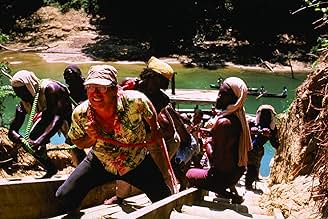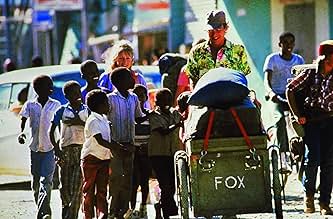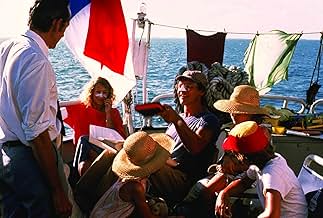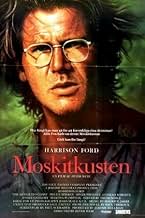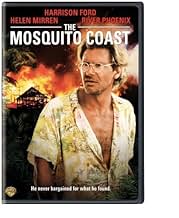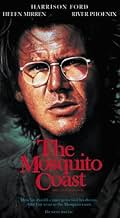An inventor spurns his city life and moves his family into the jungles of Central America to make a utopia.An inventor spurns his city life and moves his family into the jungles of Central America to make a utopia.An inventor spurns his city life and moves his family into the jungles of Central America to make a utopia.
- Awards
- 1 win & 3 nominations total
Alice Heffernan-Sneed
- Mrs. Polski
- (as Alice Sneed)
- Director
- Writers
- All cast & crew
- Production, box office & more at IMDbPro
Featured reviews
Harrison Ford is often described as a movie star rather than an actor, but "The Mosquito Coast" easily disproves that (actually, so does "Blade Runner", but I digress). It's a fevered performance on which the whole film rests. Easily worth a watch.
But it also demands a lot from the audience. For one, there's an undercurrent of dread that's there right from the start and it's hard to watch Ford's mercurial character drag his family to the far ends of the jungle essentially to reboot civilization (a myopic one, at that). All I could think of was my family in that situation (hell, no).
I'm not going to lie, this is a hard movie, rife with misfortune; on occasions shocking, infuriating and exhausting. But I was glued to my seat until the very end, primarily because of Ford's deteriorating mental state. That's a house of horrors unto itself. This is a well-directed movie but man if it's not wearing.
But it also demands a lot from the audience. For one, there's an undercurrent of dread that's there right from the start and it's hard to watch Ford's mercurial character drag his family to the far ends of the jungle essentially to reboot civilization (a myopic one, at that). All I could think of was my family in that situation (hell, no).
I'm not going to lie, this is a hard movie, rife with misfortune; on occasions shocking, infuriating and exhausting. But I was glued to my seat until the very end, primarily because of Ford's deteriorating mental state. That's a house of horrors unto itself. This is a well-directed movie but man if it's not wearing.
The Mosquito Coast is a movie that has many things going for it, but fails to combine all its excellent ingredients in a way that makes it feel great. I think there's still a good deal to like, but overall, it feels a bit unsatisfying and disappointing.
You have an interesting premise, with a deranged father leading his family to live in the wilderness. You have Harrison Ford playing one of the most villainous characters he's ever played (maybe the most villainous?) You have a great supporting cast with people like Helen Mirren and River Phoenix. You've got a fantastic composer in Maurice Jarre. And then there's Peter Weird directing, who's made several classics, often involving themes of isolation or "adventures" that go wrong or people getting by in unfamiliar situations.
At the end... it's fine? It never really hits that point where it becomes something else, though. Maybe it's Ford's character- while I found it a breath of fresh air for the protagonist to have few, if any, redeeming qualities, maybe that hurt my engagement with the film in the long run.
Anyway, good premise, good acting, good music, and the the way it's shot is solid, too. Maybe it just needed a tighter script to keep things more interesting, or at least more consistent. It does feel poorly adapted into a movie, screenplay-wise. You can tell these lines are from a novel, with much of the dialogue sounding like they're just reading off a page.
You have an interesting premise, with a deranged father leading his family to live in the wilderness. You have Harrison Ford playing one of the most villainous characters he's ever played (maybe the most villainous?) You have a great supporting cast with people like Helen Mirren and River Phoenix. You've got a fantastic composer in Maurice Jarre. And then there's Peter Weird directing, who's made several classics, often involving themes of isolation or "adventures" that go wrong or people getting by in unfamiliar situations.
At the end... it's fine? It never really hits that point where it becomes something else, though. Maybe it's Ford's character- while I found it a breath of fresh air for the protagonist to have few, if any, redeeming qualities, maybe that hurt my engagement with the film in the long run.
Anyway, good premise, good acting, good music, and the the way it's shot is solid, too. Maybe it just needed a tighter script to keep things more interesting, or at least more consistent. It does feel poorly adapted into a movie, screenplay-wise. You can tell these lines are from a novel, with much of the dialogue sounding like they're just reading off a page.
The Mosquito Coast is an odd film. It attempts to talk about issues which are important and which few films address, fails to communicate them clearly, yet isn't sucked into the maelstrom of moralizing and sententiousness that films like this almost inevitably enter. Instead, it occupies some sort of odd middle ground of ambiguity and murkiness. One gets the feeling that the film is a lot like the Fox family: they know they're going upstream but they have no specific destination, and some of them really aren't sure why they're going there in the first place.
I felt from the very beginning that the film failed to define its ideals or set a sense of clear direction. Harrison Ford, in a performance which I found unconvincing (perhaps because of the inability of the film to articulate what motivated him), rambles on about everything from the Japanese to nuclear war. There's a large difference between subtlety, i.e. not spelling things out for the viewer, and incoherence. This was incoherent. We know that he's unhappy with America, but I don't know what he's really looking for, what motivates him, etc.. Maybe he doesn't know. But if that's the case, it should be made clear.
A good example of how this plays out is his attempt to bring ice to the "noble savages." Why does he do this? Because "ice is civilization." But why does he want to bring them civilization? It seemed to me that civilization was something he was having a lot of problems with. I assume that the novel explained this more clearly and the film failed to translate properly. He of course stated earlier in the film that the savages would probably think ice a sort of jewel. So? Why does this matter? Is he looking for lost innocence?
Then later in the film "Mother" says she wishes to go to Mr. Haddy's place. He responds "And live like savages?" I can only assume that he wishes to establish some sort of elementary civilization where a small community lives in peace and harmony. Or perhaps he's just looking to withdraw from everyone, as his spurning of Mr. Haddy's gifts would show. Also, a possible literary reference is the name of their craft, Victory, which is the name of a very dull Joseph Conrad novel about a man who withdraws from life and goes to live on an island. Extreme misanthropy? Unlikely.
A possible light at the end is his talk about man not being made to walk upright. Is he looking for some sort of return to primal existence? But then why invent air conditioning in Geronimo? It all adds up to a very disorganized mess, both in Mr. Fox's head, and on screen. The Mosquito Coast is like a puzzle that still has all the pieces, but rather than fit them together, Weir just threw them all in the box and let us look at them.
I felt from the very beginning that the film failed to define its ideals or set a sense of clear direction. Harrison Ford, in a performance which I found unconvincing (perhaps because of the inability of the film to articulate what motivated him), rambles on about everything from the Japanese to nuclear war. There's a large difference between subtlety, i.e. not spelling things out for the viewer, and incoherence. This was incoherent. We know that he's unhappy with America, but I don't know what he's really looking for, what motivates him, etc.. Maybe he doesn't know. But if that's the case, it should be made clear.
A good example of how this plays out is his attempt to bring ice to the "noble savages." Why does he do this? Because "ice is civilization." But why does he want to bring them civilization? It seemed to me that civilization was something he was having a lot of problems with. I assume that the novel explained this more clearly and the film failed to translate properly. He of course stated earlier in the film that the savages would probably think ice a sort of jewel. So? Why does this matter? Is he looking for lost innocence?
Then later in the film "Mother" says she wishes to go to Mr. Haddy's place. He responds "And live like savages?" I can only assume that he wishes to establish some sort of elementary civilization where a small community lives in peace and harmony. Or perhaps he's just looking to withdraw from everyone, as his spurning of Mr. Haddy's gifts would show. Also, a possible literary reference is the name of their craft, Victory, which is the name of a very dull Joseph Conrad novel about a man who withdraws from life and goes to live on an island. Extreme misanthropy? Unlikely.
A possible light at the end is his talk about man not being made to walk upright. Is he looking for some sort of return to primal existence? But then why invent air conditioning in Geronimo? It all adds up to a very disorganized mess, both in Mr. Fox's head, and on screen. The Mosquito Coast is like a puzzle that still has all the pieces, but rather than fit them together, Weir just threw them all in the box and let us look at them.
I have read the book and watched the film, and because of Harrison Ford's uncanny portrayal of the lead character he should have received an Oscar. There is an eerie scariness in the coming to life inventor- father to a mad scientist with humanistic touches. The book gave deep and colorful look at this man, but Ford alone made him transition from words to life. A deep look at someone with high ideals who becomes disillusioned at American way of life.
I can almost guarantee that anyone who has seen 'The Mosquito Coast', then looked at the subject line of this review, thinks I'm crazy. The truth is that this film is deeply flawed and undeniably weak in many regards, but it had a quality I cannot describe. This is the only film I have ever seen that, despite many shortcomings, manages to come out of the storm relatively unscathed, and become an unforgettable, almost haunting, movie.
The production values are immaculate. Peter Weir's direction is excellent, and is in top form here. He has crafted a thick shell that blocks the flaws from coming up to the surface, an indescribable feat that very few directors have accomplished. The musical score is good, not outstanding, but it's fitting, and surprisingly subtle. There is only about six minutes out of the entire film that has musical accompaniment, which makes for a very unique experience, and not necessarily a bad one. The tropical cinematography is dazzling, and the decision to shoot on location in Belize instead of on a studio back lot really paid off, contributing greatly to the film's success.
As good as the mentioned characteristics are, nothing is as good as the acting, especially that from the two leads: Harrison Ford and River Phoenix. Prior to this, Ford had made a name for himself with big budget action roles, with several failed attempts at drama (Hanover Street being the best example of that). It wasn't until 1985's 'Witness' (which Peter Weir also directed, that Ford was taken seriously as an all around actor. Personally I think Ford's performance here greatly overshadowed his work in 'Witness', and is a career best for him, even in the light of 'Regarding Henry' and 'Presumed Innocent', both made after his. He takes the character of Allie Fox, and moulds him into a selfish, driving maniac, blind to the wishes of others, only caring for himself. Phoenix, on the other hand, deserves even more acclaim, for several reasons. For one, this was only his third film, after 1985's 'Explorers', and 'Stand by Me', made right before this. Secondly, he was only 15 at the time of the shoot, and had little acting experience, yet he easily out acted most of his co-stars. Though his performance wasn't quite as refined as Ford's was, he still reached a level of near perfection and set the stage for a glorious, and ultimately tragic, career.
The story is one of utter genius, one of the few original ones popping up in an industry full of sequels, remakes and rip offs. Based on the 1981 bestseller by Paul Theroux, and co-starring Helen Mirren, 'The Mosquito Coast' deserves a place among the best films of the 80's.
But wait, I'm not done. Despite a great exterior, deep inside the movie is troubled. It's as if director Weir pushed all the movie's problems deep down under the surface, then piled layer after layer of... something, on top of it, hiding them from the clueless audience. My main problem with the movie is that it yearns to break away from it's literary roots, a problem that could've been easily avoided had the right script come along. Entire conversations are lifted from the text, and there isn't a single line that doesn't have an equal counterpart in the novel. For me this got extremely tedious as, hours before popping in the tape for a second viewing, I had finished the book, and the two are much too similar.
Another problem I have with it is that the scenes are much too short, with none of them running over about a minute and a half. An obvious result of this is that many subplots remain unresolved, and several concepts are hinted at, but go without further explanation, making for a confusing story. If the screenwriter had put a little more effort into making the film different than the book, with new scenes, we would have seen a much better end product.
A third, albeit a smaller one, is that the production team apparently spent too much time making sure that the movie would get a PG rating, though it would've been much better had it gotten an R, or even a PG-13 rating. That would've allowed Ford a little more breathing room to tweak his character, possibly allowing Allie to become less sympathetic, more of a madman.
I can't think of much more worth saying to put in this review, so I'll end it with this note: see the movie, even if you've read the book, but don't do the two back to back.
The production values are immaculate. Peter Weir's direction is excellent, and is in top form here. He has crafted a thick shell that blocks the flaws from coming up to the surface, an indescribable feat that very few directors have accomplished. The musical score is good, not outstanding, but it's fitting, and surprisingly subtle. There is only about six minutes out of the entire film that has musical accompaniment, which makes for a very unique experience, and not necessarily a bad one. The tropical cinematography is dazzling, and the decision to shoot on location in Belize instead of on a studio back lot really paid off, contributing greatly to the film's success.
As good as the mentioned characteristics are, nothing is as good as the acting, especially that from the two leads: Harrison Ford and River Phoenix. Prior to this, Ford had made a name for himself with big budget action roles, with several failed attempts at drama (Hanover Street being the best example of that). It wasn't until 1985's 'Witness' (which Peter Weir also directed, that Ford was taken seriously as an all around actor. Personally I think Ford's performance here greatly overshadowed his work in 'Witness', and is a career best for him, even in the light of 'Regarding Henry' and 'Presumed Innocent', both made after his. He takes the character of Allie Fox, and moulds him into a selfish, driving maniac, blind to the wishes of others, only caring for himself. Phoenix, on the other hand, deserves even more acclaim, for several reasons. For one, this was only his third film, after 1985's 'Explorers', and 'Stand by Me', made right before this. Secondly, he was only 15 at the time of the shoot, and had little acting experience, yet he easily out acted most of his co-stars. Though his performance wasn't quite as refined as Ford's was, he still reached a level of near perfection and set the stage for a glorious, and ultimately tragic, career.
The story is one of utter genius, one of the few original ones popping up in an industry full of sequels, remakes and rip offs. Based on the 1981 bestseller by Paul Theroux, and co-starring Helen Mirren, 'The Mosquito Coast' deserves a place among the best films of the 80's.
But wait, I'm not done. Despite a great exterior, deep inside the movie is troubled. It's as if director Weir pushed all the movie's problems deep down under the surface, then piled layer after layer of... something, on top of it, hiding them from the clueless audience. My main problem with the movie is that it yearns to break away from it's literary roots, a problem that could've been easily avoided had the right script come along. Entire conversations are lifted from the text, and there isn't a single line that doesn't have an equal counterpart in the novel. For me this got extremely tedious as, hours before popping in the tape for a second viewing, I had finished the book, and the two are much too similar.
Another problem I have with it is that the scenes are much too short, with none of them running over about a minute and a half. An obvious result of this is that many subplots remain unresolved, and several concepts are hinted at, but go without further explanation, making for a confusing story. If the screenwriter had put a little more effort into making the film different than the book, with new scenes, we would have seen a much better end product.
A third, albeit a smaller one, is that the production team apparently spent too much time making sure that the movie would get a PG rating, though it would've been much better had it gotten an R, or even a PG-13 rating. That would've allowed Ford a little more breathing room to tweak his character, possibly allowing Allie to become less sympathetic, more of a madman.
I can't think of much more worth saying to put in this review, so I'll end it with this note: see the movie, even if you've read the book, but don't do the two back to back.
The Life and Times of Harrison Ford
The Life and Times of Harrison Ford
Take a look back at Harrison Ford's movie career in photos.
Did you know
- TriviaWhile building the town set in Belize, the crew unearthed an ancient Mayan temple. It notified the Belize government, which declared the site an important historical find.
- GoofsThe "Ice from Fire" technique for using heat, ammonia and hydrogen was actually invented in 1824 by the English scientist Michael Faraday.
- Quotes
Emily Spellgood: [to Charlie] I think about you when I go to the bathroom.
- SoundtracksClap Your Hands
Words and Music by Gary Johnson
Performed by Grace Gospel Primary School Choir
- How long is The Mosquito Coast?Powered by Alexa
- Who are the three men that Allie meets in the remote village and who come to Jeronimo later? Why were they hiding when Allie and his party arrived?
- Early in the film Allie presents his machine to a farmer but the farmer scoffs and rejects it. Why didn't he want it?
- Why did Allie tell the armed men that his village was infested with ants?
Details
Box office
- Budget
- $25,000,000 (estimated)
- Gross US & Canada
- $14,302,779
- Opening weekend US & Canada
- $110,313
- Nov 30, 1986
- Gross worldwide
- $14,302,779
- Runtime1 hour 57 minutes
- Color
- Sound mix
- Aspect ratio
- 1.85 : 1
Contribute to this page
Suggest an edit or add missing content





